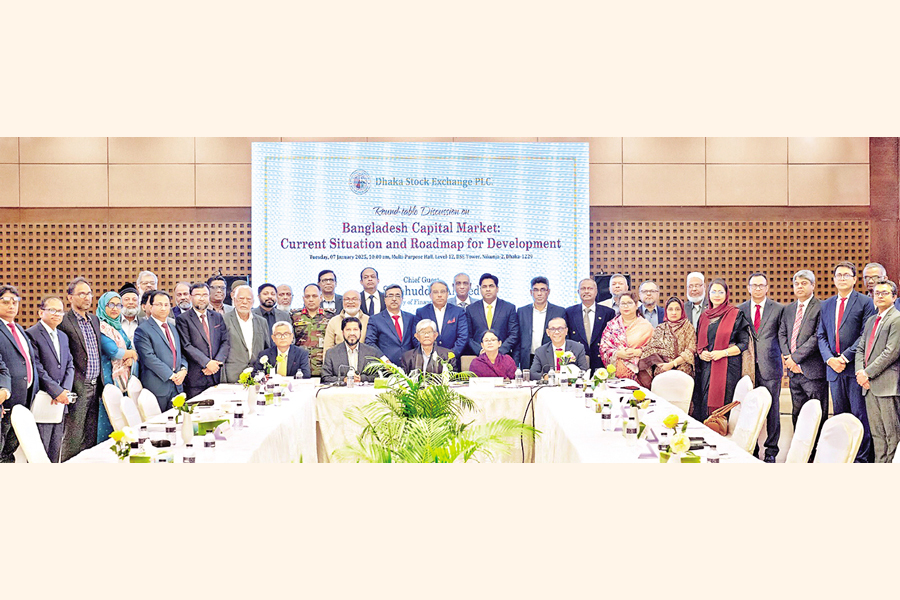
Published :
Updated :

 The interim government will offer tax incentives in the upcoming budget to encourage foreign and family-owned corporations to be listed in the capital market, says Finance Adviser Dr. Salehuddin Ahmed.
The interim government will offer tax incentives in the upcoming budget to encourage foreign and family-owned corporations to be listed in the capital market, says Finance Adviser Dr. Salehuddin Ahmed.
"The government will provide policy support and tax benefits to inspire new listings," he said at a meeting with the Dhaka Stock Exchange (DSE) on Tuesday. Initiatives have already been taken to bring some government companies to the market, he added.
The meeting participants discussed at great length the lack of depth of the equity market against the backdrop of successful businesses preferring to remain out of it.
Dr Salehuddin said well-performing family-owned entities are not interested in entering the market so that they do not have to share profits with the public.
"The owners of these companies think their sons will be directors and wives chairmen."
The adviser, however, emphasized that listing ensures good management and corporate governance. "Companies do not want to go public to avoid questions from the regulatory bodies and annual general meetings."
Fund raising through initial public offerings (IPOs) has shrunk as no new company received IPO approval last year.
Regulatory approval of IPO proposals of four companies in 2023 led to a collection of Tk 6.45 billion last year.
The market will become vibrant if it gains more stocks of good companies and vice versa.
At Tuesday's meeting, DSE Chairman Mominul Islam spoke of a temporary arrangement for direct listing of selective companies.
As per the existing securities rules, a company is required to go public when its paid-up capital exceeds Tk 500 million. Companies, however, do not increase paid-up capital to avoid listing but show bank borrowings behind turnovers much larger than their paid-up.
Participants talked about setting up debt thresholds for companies of different industries, making it mandatory to raise money by floating shares to the public once the relevant threshold is surpassed.
They also said a bank should not be allowed to disburse long-term loans beyond a specific portion of its total lending.
"Regulators and stakeholders will hold more discussions before reaching a consensus on a mandatory provision of raising capital from the market," said the DSE chairman.
The coordination between the Bangladesh Bank and the securities regulator has weakened recently, which is another obstacle to the market's smooth operation, said Mr Ahmed.
At the meeting, the Financial Institutions Division (FID) was given the responsibility to maintain coordination among stakeholders of the capital market.
"The FID will hold coordination meetings with the stakeholders on a regular basis," a meeting source said.
The finance adviser also urged market stakeholders, including the DSE, to take initiatives to increase the investment of expatriate Bangladeshis in the country's stock market.
Referring to the Indian stock market that has a large investment of expatriates, he said many expatriate Bangladeshis have the capability to invest in the market. "They should be encouraged to do so."
On the market index, he said investors are happy when the index rises. "But when the market goes up abnormally, investors should be cautious."
At the meeting, representatives of the securities regulator said they do not influence daily trades in the secondary market.
"The regulator will work as a regulator and the exchanges will operate the market," said DSE Director Md. Shakil Rizvi.
At the meeting, the reduced gap of corporate tax for listed and non-listed companies was criticised.
The tax rate gap was narrowed in the previous budget to 2.5 per cent for FY25 from 5 per cent, subject to some conditions.
Professor Abu Ahmed, chairman of the ICB, said the tax gap should be broadened to inspire companies to go public.
Representatives of the National Board of Revenue (NBR) spoke in favour of widening the gap.
Mr Ahmed requested the stakeholders to submit relevant proposals to the revenue board.
The listing of multinational companies (MNCs) also came under discussion. Participants gave references to other countries where MNCs share profits with the public.
The securities regulator told the meeting that it would sit with MNCs to know the reasons behind their reluctance in going public.
Investment of undistributed dividends in equities by the Capital Market Stabilisation Fund (CMSF) was also strongly criticised at the meeting.
At the meeting, the finance adviser asked the task force formed by the Bangladesh Securities and Exchange Commission to start submitting recommendations for market reforms in phases so that changes become visible.
The government has also strengthened the capacity of the Investment Corporation of Bangladesh (ICB) to play its role in the stock market. Recently, the state-run investment bank received Tk 30 billion low-cost fund to support the market.
mufazzal.fe@gmail.com
babulfexpress@gmail.com


 For all latest news, follow The Financial Express Google News channel.
For all latest news, follow The Financial Express Google News channel.